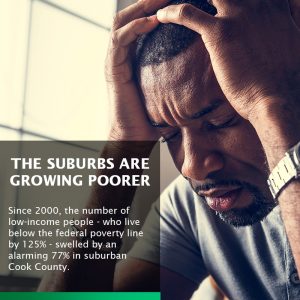Jobs play a central role in the lives of most adults, allowing individuals not just to afford basic needs, but also to build a secure life and be positive forces in their neighborhoods. Unfortunately, not everyone is offered a seat at the table.
 The last economic recovery saw an increase in jobs, however the growth was often in low-paying occupations. While there were more jobs, they weren’t providing people the opportunities they need to lift themselves out of poverty and into a better future.
The last economic recovery saw an increase in jobs, however the growth was often in low-paying occupations. While there were more jobs, they weren’t providing people the opportunities they need to lift themselves out of poverty and into a better future.
The suburbs are growing poorer. Since 2000, the number of low-income people – who live below the federal poverty level by 125% – swelled by an alarming 77% in suburban Cook County.
In addition to low wages, there is a disconnect between the location of jobs and the location of affordable housing in and around Cook County. What good is a job if the person can’t get to it? And if an individual needs to move closer, how are they supposed to afford to relocate when they can’t pay existing bills?
Stagnant wages and poor-quality jobs are making it hard to escape poverty. 40% of people surveyed indicated that finding a job to support their family was a top priority. Now, with 10-fold unemployment rates every week, the need for stable career opportunities is critical.
I n April 2020, unemployment across Cook County rose to 18.2% from 4.8% in March.* People who are out of work are left with a greater sense of insecurity as a pandemic shifts the way we as a country will go back to work. Already companies have begun restructuring.
n April 2020, unemployment across Cook County rose to 18.2% from 4.8% in March.* People who are out of work are left with a greater sense of insecurity as a pandemic shifts the way we as a country will go back to work. Already companies have begun restructuring.
Restructuring heavily impacts workers who are not technically-savvy and have lower levels of education. They are at risk of becoming collateral damage in this new labor market, especially if they lack the education or training to get noticed.
Almost 100,000 teens and young adults in Chicagoland are neither in school nor working, lacking the skills and education well-paying jobs require.
It is time to give our neighbors a seat at the table. To increase education and job-training opportunities with the ultimate goal of creating stable careers for adults and youth throughout the county, CEDA invests in:
- Developing a 35,000 square foot, state-of-the-art training center in South Holland, IL.
- Expanding access to postsecondary education and skills training for adults and youth.
- Building partnerships with businesses and other organizations to increase career opportunities for low-wage workers and job seekers, as well as the pool of candidates with skills employers seek.
 When individuals have the skills and education, they have the opportunity to start jobs that will lead to careers.
When individuals have the skills and education, they have the opportunity to start jobs that will lead to careers.
Meaningful employment is a key component of moving people out of poverty.
Poverty cannot be eradicated without jobs and learning opportunities. If our neighbors continue living paycheck to paycheck and barely, if at all, meet their basic needs, our community cannot thrive. Investment in change is critically needed for Chicagoland to REBUILD when the COVID-19 crisis ends.
We are always looking for innovative ways to provide youth and adults living in poverty across Cook County seats at the table. When an investment is made in individuals and the structures to support them, they can invest in their families and communities and break the cycle of poverty. We cannot end poverty without you. Help give individuals across Chicagoland a seat at the table.
I want to help
I’m trying to grow my small business plus develop the area I live in